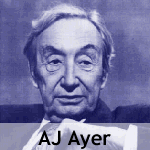Criticisms
Ayer's logical positivism is self-defeating - it is, by its own standards, meaningless.
Hare makes a different point. Emotivism is inaccurate. It says that when I say "Rape is wrong" I am merely saying "I don't like rape". Clearly I am saying something else too. When I say "I don't like bananas", I don't expect you or anyone else to agree with me. When I say that it is wrong to rape, I am saying this is something that you should not do. Prescriptivism is a criticism of emotivism.
CL Stevenson recognised that there was more to my moral statements than a simple expression of emotion. Stevenson can be seen as a critic of Ayer, yet also an emotivist. He recognises that moral statements are based on deeply held convictions, even though these are subjective. Critics say Stevenson is wrong to discount the role reason plays in ethics.
People generally agree that a bus is red, leaves are green and the sky is blue. They do not agree on what is right and wrong. Intuitionists can't agree among themselves - Moore held to the principle of utility, while Ross took a deontological approach. If we knew what was right and wrong by intuition, our intuitions should generally agree.
There are many people who support this kind of position, who claim for example that Nazis asked to perform atrocities should simply have known that what they were being asked to do was wrong. They might argue that we all do agree on basic human rights etc. The criticism is that this simply isn't true, and that we clearly do not agree.
Hare argued that it made no sense to say "I ought to do X" and then not do X. This takes no account of the weakness of the will, and he has been criticised for this.
Hare's achievement is to justify adhering to universal moral principles - these are assumed whenever I say "You ought to..."; I must mean "I ought to..." as well.
Hare developed a form of preference utilitarianism - we should act in such a way as to maximise as many preferences as possible. This may be criticised as going further than hs theory justifies. Clearly if I use languange like "You ought to..." I am commiting myself to do the same in similar situations. However, this doesn't prove that meeting people's preferences is actually the right thing to do.

